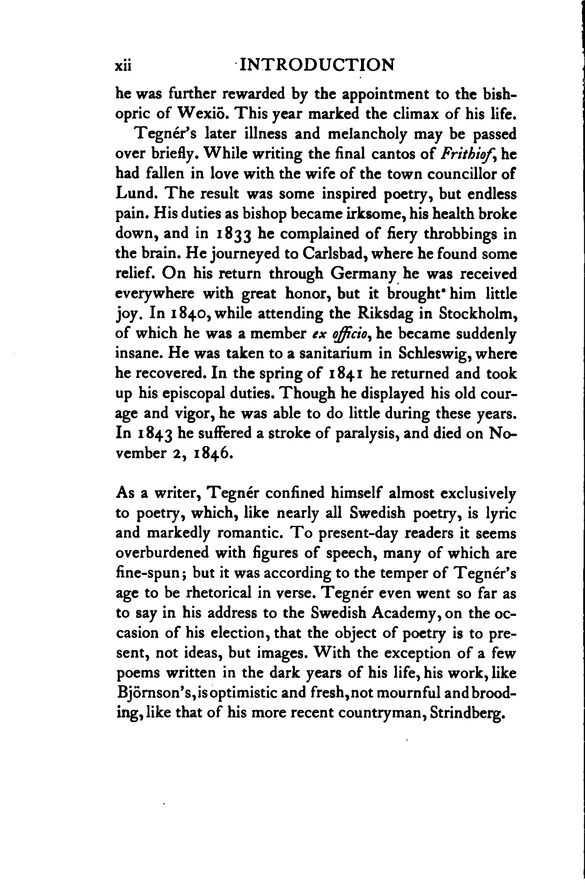
Full resolution (JPEG) - On this page / på denna sida - Introduction

<< prev. page << föreg. sida << >> nästa sida >> next page >>
Below is the raw OCR text
from the above scanned image.
Do you see an error? Proofread the page now!
Här nedan syns maskintolkade texten från faksimilbilden ovan.
Ser du något fel? Korrekturläs sidan nu!
This page has never been proofread. / Denna sida har aldrig korrekturlästs.
xviii
INTRODUCTION
he was further rewarded by the appointment to the
bishopric of Wexio. This year marked the climax of his life.
Tegner’s later illness and melancholy may be passed
over briefly. While writing the final cantos of Frithiof, he
had fallen in love with the wife of the town councillor of
Lund. The result was some inspired poetry, but endless
pain. His duties as bishop became irksome, his health broke
down, and in 1833 he complained of fiery throbbings in
the brain. He journeyed to Carlsbad, where he found some
relief. On his return through Germany he was received
everywhere with great honor, but it brought* him little
joy. In 1840, while attending the Riksdag in Stockholm,
of which he was a member ex officio, he became suddenly
insane. He was taken to a sanitarium in Schleswig, where
he recovered. In the spring of 1841 he returned and took
up his episcopal duties. Though he displayed his old
courage and vigor, he was able to do little during these years.
In 1843 he suffered a stroke of paralysis, and died on
November 2, 1846.
As a writer, Tegner confined himself almost exclusively
to poetry, which, like nearly all Swedish poetry, is lyric
and markedly romantic. To present-day readers it seems
overburdened with figures of speech, many of which are
fine-spun; but it was according to the temper of Tegner’s
age to be rhetorical in verse. Tegner even went so far as
to say in his address to the Swedish Academy, on the
occasion of his election, that the object of poetry is to
present, not ideas, but images. With the exception of a few
poems written in the dark years of his life, his work, like
Bjornson’s,is optimistic and fresh,not mournful
andbrood-ing, like that of his more recent countryman, Strindberg.
<< prev. page << föreg. sida << >> nästa sida >> next page >>